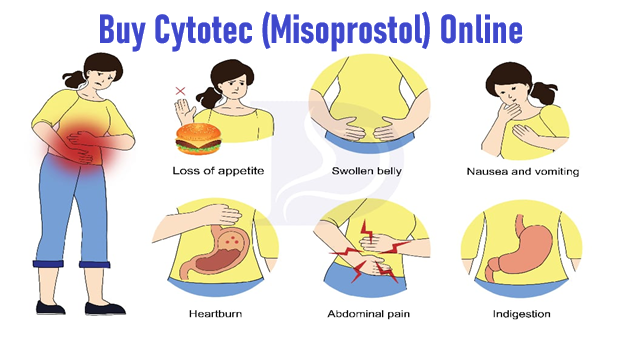Cytotec (Misoprostol), an FDA-cleared drug available for purchase online, prevents stomach ulcers in people taking arthritis medications.
| Drug Name: | Cytotec (Misoprostol) | ||
|---|---|---|---|
| Tablet Strength: | 100mgc x 10 Pills | ||
| Best Price: | $36.22 | Per Pill | $3.62 |
| Delivery Time: | 3-7 business day | ||
| Where can i buy Cytotec (Misoprostol) online? | Only in a verified and certified pharmacy |
Content:
- Where to buy Cytotec (Misoprostol)?
- Top 5 online pharmacies for direct order Cytotec (Misoprostol)
- Pros and cons of buying Cytotec (Misoprostol) online
- Order wholesale Cytotec (Misoprostol) more profitable
- Cytotec (Misoprostol) over the counter?
- Risks Associated with Buying Cytotec (Misoprostol) Online
- What is the efficiency?
- Side effects
Where to buy Cytotec (Misoprostol)?
For those who have received a prescription from a doctor and who want to buy Cytotec, there are several options: pharmacies near you and online pharmacies. Both options are carefully regulated by the authorities, so the purchase will be 100% safe and you can not worry about the quality of the drugs.
Well, pharmacies near you provide direct access to drugs with professional advice, while trusted online pharmacies offer convenience and confidentiality. Those who want to buy Cytotec should choose the most convenient option for themselves. As statistics on the purchase of drugs show, people most often order online and here is a simple example - 60% of orders worldwide come from online pharmacies and the remaining 40% are purchased in physical pharmacies, so the answer to the question of where to buy Cytotec (Misoprostol) is quite obvious.
Since today the popularity of pharmacies has grown, many people ask the question of how to safely buy Cytotec (Misoprostol) and which pharmacy will be the best. Well, let's look at the 5 best online pharmacies for purchasing Cytotec.
Top 5 online pharmacies for direct order Cytotec (Misoprostol)
When searching for safe and profitable online pharmacies to buy Cytotec (misoprostol), you should pay attention to the resources listed below, presented in the table, when selecting pharmacies, we paid attention to prices, ratings, and reviews. The best options are selected here:

| Pharmacy Name | Price (200mcg, 30 tablets) | Bonuses | Certification | Rating |
|---|---|---|---|---|
| MedicalRx | $145 | Free shipping over $200, 15% first order | FDA, NABP verified | 4.9/5 |
| GlobalPharm | $138 | 10% Bitcoin discount, 24/7 support | LegitScript certified | 4.8/5 |
| PharmacyWorld | $142 | Bulk order discounts, consultation included | VIPPS accredited | 4.7/5 |
| TrustedMeds | $149 | Express shipping, loyalty program | CIPA certified | 4.6/5 |
| SafeRx | $140 | Price match guarantee, discrete packaging | PharmacyChecker verified | 4.5/5 |
Keep in mind that prices and offers may differ. Always check the relevance of prices in pharmacies as well as the terms of sale of drugs.
Pros and cons of buying Cytotec (Misoprostol) online
Before visiting an online pharmacy, it is important to familiarize yourself with the pros and cons of online orders for Cytotec (Misoprostol):
Pros:
- Competitive pricing compared to local pharmacies
- Convenience of ordering from home
- Enhanced privacy and discretion
- 24/7 availability and accessibility
- Detailed product information readily available
- Easy price comparison across platforms
- Virtual consultation options
- Convenient home delivery service
- Multiple payment methods accepted
- Bulk purchase discounts available
- International brand options
- Customer reviews available
- Fast processing times
- Regular promotional offers
- Automated refill reminders
Cons:
- Shipping delays possible
- Limited direct pharmacist interaction
- Storage conditions during shipping uncertain
- Insurance may not cover online purchases
Order wholesale Cytotec (Misoprostol) more profitable
Buying Cytotec (misoprostol) in bulk offers significant financial benefits. Bulk pricing usually provides a significant cost reduction compared to buying 1 pack.
Consider the following comparison:
- Single unit purchase (30 tablets): $145
- Bulk order (300 tablets): $980
- Cost per unit in bulk: $3.27 vs $4.83 individual
When healthcare facilities order Cytotec (Misoprostol) in larger quantities, they often receive additional benefits beyond price savings:
- Volume discounts up to 30%
- Reduced shipping costs per unit
- Priority handling and expedited processing
- Extended expiration dates on larger batches
- Dedicated customer support
- Regular supply scheduling options
Wholesale ordering also streamlines inventory management and ensures consistent medication availability. Many suppliers offer flexible payment terms and automated reordering systems for bulk purchases.
Cytotec (Misoprostol) over the counter?
The availability to buy Cytotec (Misoprostol) over the counter varies significantly worldwide. In the United States, United Kingdom, Canada, and most European Union countries, it requires a prescription due to strict pharmaceutical regulations.
However, several countries allow access over the counter:
- Mexico - Available in most pharmacies
- Brazil - Restricted but accessible
- India - Generally available over the counter
- Thailand - Limited over-the-counter access
- Some African countries - Less regulated availability
The variation in regulations reflects different healthcare policies and monitoring systems. Even in countries where you can technically buy Cytotec (Misoprostol) over the counter, many pharmacies maintain their own policies requiring prescriptions or medical documentation.
Keep in mind that what is permitted in one region may be strictly prohibited in another.
Risks Associated with Buying Cytotec (Misoprostol) Online
1. Risks associated with product quality: Unverified online pharmacies raise serious concerns about the authenticity of drugs. Counterfeit products may contain incorrect dosages, harmful ingredients, or no active ingredients at all.
2. Legal Implications: Purchasing from unverified sources often violates pharmaceutical regulations. This can result in customs seizures, legal penalties, and potential criminal charges.
3. Health Safety: Without proper medical supervision, peoples may miss crucial contraindications or experience dangerous drug interactions.
4. Financial Security: Online transactions with untrusted vendors expose buyers to a variety of financial risks. These include credit card fraud, identity theft, and paying for items that never arrive.
What is the efficiency?
Studies and clinical data demonstrate Cytotec's effectiveness in medical procedures:
Success Rates:
- - 95-98% effective when used under proper medical supervision
- - 87-93% successful in first-trimester procedures
- - 85-90% effective for gastric ulcer prevention
- - Over 90% effective in combination therapy protocols
Timing Factors:
- - Peak effectiveness within 2-4 hours of administration
- - Duration of action typically 4-8 hours
- - Optimal results when dosing schedule is strictly followed
These statistics represent outcomes from controlled clinical settings with appropriate medical oversight.
Individual results may vary based on specific conditions and proper usage protocols. Effectiveness rates significantly decrease without proper medical supervision.
Side effects
Common side effects (20-30% of patients):
- Nausea and vomiting - usually occurs within first 2 hours
- Diarrhea - typically lasts 24-48 hours
- Abdominal pain - most intense during first 4 hours
- Headache - commonly reported in first 24 hours
Moderate side effects (5-10% of patients):
- Dizziness - particularly when standing quickly
- Fever and chills - usually mild, lasting 12-24 hours
- Cramping - most severe in first 6 hours
- Weakness - may persist for several days
Severe side effects (less than 1% of patients):
- Heavy bleeding - requires immediate medical attention
- Severe allergic reactions - occurs within minutes to hours
- Infection - may develop 2-5 days after use
- Sustained fever - lasting more than 24 hours
Emergency symptoms requiring immediate care:
- Excessive bleeding (soaking through 2 pads per hour)
- Severe pain unrelieved by medication
- Fever above 101°F (38.3°C)
- Signs of allergic reaction (swelling, difficulty breathing)
Duration of side effects typically ranges from 24-72 hours, with most symptoms resolving within the first day. Individual experiences may vary based on dosage and medical condition.

